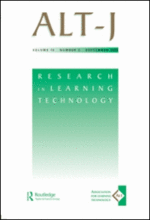 I am very pleased to announce that I am Editorial Board Member of the International Journal for Innovation and Quality in Learning. The most promising fact for me is that this journal like to establish an Open Discussion during the review process – this looks very interesting and I am happy to gather some experiences with this possibility.
I am very pleased to announce that I am Editorial Board Member of the International Journal for Innovation and Quality in Learning. The most promising fact for me is that this journal like to establish an Open Discussion during the review process – this looks very interesting and I am happy to gather some experiences with this possibility.
The European Foundation for Quality in E Learning (EFQUEL) will is preparing the launch of the “International Journal for Innovation and Quality in Learning” (INNOQUAL) which will provide an international perspective on the theory and practice of innovation and quality in the field of learning at all educational levels and in all training contexts.
One core mission is to create more open dialogue on research in the area. I am pleased to invite you to join the open discussion on five selected papers, which are candidates for the inclusion into the INNOQUAL inaugural journal to be published in April 2013. No registration, no downloads, no long review forms are needed. You can simply comment on the papers directly via google docs following our easy ground rules.
All five papers are presented at the INNOQUAL website:
- “Knowledge Exchange Across Borders – Internationalization of Open Education using Trusted Educational Networks”
- “Transtitution – Transforming higher educational institutions through modernization of middle management”
- “E-Learning quality assurance as a tool for open innovation in educational institutions: an Estonian case”
- “A view on Personal Learning Environments through approaches to learning”
- “Evaluating teaching and management innovations in an online university: the case of the Universitat Oberta de Catalunya”
Get inspired, support authors who are willing to make review procedures more open, find peers who are also interested in discussing research in this area openly.



